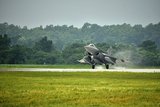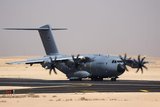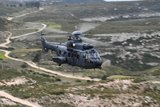Lockheed Martin takes $172 million contract modification for F-35 Block 4 jets
The new contract modification will help increase the manufacturing capacity of F-35 Block 4. (Photo: US DoD)
Lockheed Martin has secured a modification order against a previously issued basic ordering agreement.
The $172 million modification definitizes the order and includes special test/tooling equipment for increasing F-35 Block 4 manufacturing capacity.
It also procures material modification kits to remove life limits, correct deficiencies and retrofit aircraft to incorporate the Next-Gen Distributed Aperture System hardware and associated Power and Thermal Management System modifications efforts.
This contract modification is in support of F-35 aircraft for the USAF, the USMC, USN, Foreign Military Sales (FMS) customers and non-US DoD participants.
The work will take place in Fort Worth, Texas, and is expected to be completed in December 2030.
This contract modification will help increase the manufacturing capacity of Block 4 and will support the retrofitting of aircraft to incorporate Next Gen Distributed Aperture System hardware and associated Power and Thermal Management System modifications efforts.
The Naval Air Systems Command, Patuxent River, Maryland, is the contracting activity.
Related Equipment in Defence Insight
More from Air Warfare
-
![Focus on economy over capability highlights the cost imperative for CCA success]()
Focus on economy over capability highlights the cost imperative for CCA success
Striking the right balance between cost and capability is likely to become more crucial in the increasingly competitive collaborative combat aircraft market. Shephard’s special CCA market report examines where the opportunities lie for suppliers.
-
![Saudi Arabia air report: The world’s fourth-largest UAV market seeks to strengthen domestic industry]()
Saudi Arabia air report: The world’s fourth-largest UAV market seeks to strengthen domestic industry
With $9.18 billion in uncontracted programmes — including a potential multi-billion-dollar MQ-9B deal — Saudi Arabia’s UAV sector is poised for significant further growth and industrial expansion.
-
![AI mission-autonomy software integration and partnerships see progress across CCA efforts]()
AI mission-autonomy software integration and partnerships see progress across CCA efforts
The successful integration of third-party mission autonomy in the US Air Force’s CCA programme and movement on Helsing’s Europa CA-1 timelines mark key milestones in the development of uncrewed aerial capabilities.
-
![Airbus Helicopters is deepening its European reach as NATO orders climb]()
Airbus Helicopters is deepening its European reach as NATO orders climb
Airbus has delivered more than 2,000 helicopters to nations across Europe, and continues to solidify its position at the heart of the region’s defence industrial base.























